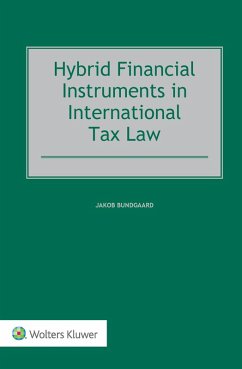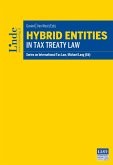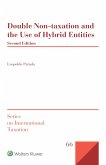Financial innovation allows companies and other entities that wish to raise capital to choose from a myriad of possible instruments that can be tailored to meet the specific business needs of the issuer and investor. However, such instruments put increasing pressure on a question that is fundamental to the tax and financial systems of a country - the distinction between debt and equity. Focusing on hybrid financial instruments (HFIs) - which lie somewhere along the debt-equity continuum, but where exactly depends on the terms of the instrument as well as on applicable laws - this book analyses their treatment under both domestic law and tax treaties. Key jurisdictions, including the EU, some of its Member States, and the United States, are covered.Advocating for a broader scope of application of HFIs as part of the financing of companies in Europe alongside traditional sources of debt and equity financing, the book addresses such issues and topics as the following: problems associated with the debt-equity distinction in international tax law; cross-border tax arbitrage and linking rules; drivers behind the use and design of HFIs; tax law impact of perpetual and super maturity debt instruments, profit participating loans, convertible bonds, mandatory convertible bonds, contingent convertibles, preference shares and warrant loans on HFIs; financial accounting treatment; administrative guidance; influence of the TFEU on Member States' approaches to classification of HFIs; interpretation of the Parent-Subsidiary Directive by the European Court of Justice; applicability of the OECD Model Tax Convention; and implications of the OECD Base Erosion and Profit Shifting (BEPS) project.Throughout this book, the analysis draws upon preparatory works, case law, and legal theory in English, German, and the Scandinavian languages. In conclusion, the author considers tax policy issues, and identifies and outlines possible high-level solutions.Actual or potential users of HFIs will greatly appreciate the clarity and insight offered here into the capacity and tax implications of HFIs. The book not only examines whether existing legislation is sufficient to handle the issues raised by international HFIs, but also provides an in-depth analysis of the interaction between corporate financing and tax law in the light of today's financial innovation. Corporate executives and their counsel will find it indispensable in the international taxation landscape that is currently coming into view, and academics and policymakers will hugely augment their understanding of a complex and constantly changing area of tax law .
Dieser Download kann aus rechtlichen Gründen nur mit Rechnungsadresse in A, B, BG, CY, CZ, D, DK, EW, E, FIN, F, GR, HR, H, IRL, I, LT, L, LR, M, NL, PL, P, R, S, SLO, SK ausgeliefert werden.









